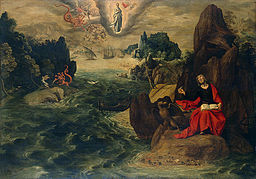 Revelation 1:9-11 says, “I, John, your brother and fellow partaker in the tribulation, kingdom, and perseverance that are in Jesus, was on the island called Patmos because of the word of God and the testimony of Jesus. I was in the Spirit on the Lord’s day and I heard behind me a loud voice like a trumpet saying, ‘What you see write in a book and send it to the seven churches, to Ephesus, to Smyrna, to Pergamum, to Thyatira, to Sardis, to Philadelphia, and to Laodicea.’”
Revelation 1:9-11 says, “I, John, your brother and fellow partaker in the tribulation, kingdom, and perseverance that are in Jesus, was on the island called Patmos because of the word of God and the testimony of Jesus. I was in the Spirit on the Lord’s day and I heard behind me a loud voice like a trumpet saying, ‘What you see write in a book and send it to the seven churches, to Ephesus, to Smyrna, to Pergamum, to Thyatira, to Sardis, to Philadelphia, and to Laodicea.’”
When I read these verses, I am drawn into thinking about John–his life, his ministry, his world. He was on Patmos “because of the word of God and the testimony of Jesus.” I am inclined to agree with the majority interpretation that sees John’s time on the island of Patmos as a time of exile due to his ministry as a Christian leader and missionary. He is probably quite old at this time (sometime in the 90’s) and quite likely the last of the apostles to be alive. Jesus himself is responsible for the thought that John would outlive Peter (John 21:18-23). Patmos was a convenient place to exile and isolate John from the churches of Asia Minor.
On an isolated island, miles away from his beloved churches, it would seem likely that John would be wondering what next. Here he was, an old man who had invested so much in raising up and nurturing churches in Asia Minor. I can imagine John going through a time of questioning like the following. Why would God allow this to happen? Why did he put me here? What effect was this going to have on the churches of Asia Minor?
John’s questions are suddenly answered when Jesus shows up, speaks to him, and gives him a new job. He is going to receive revelations that he is supposed to write down and send to the churches of Asia Minor. Like other prophets before him, God was going to use John to write down this message and use it to build up and challenge his people.
Thinking about John on Patmos encourages me to have faith in God and his purposes. He had a new and wonderful assignment for John on Patmos. His time on Patmos would not be in vain, but would be useful for edifying Christians throughout the ages. We too can trust in God and in his ability to work in and through us, even in circumstances that do not look promising or that are difficult to understand. What is God doing? Why did he put me here? It can be hard to know, but perhaps we need to ask God and see what unfolds.
For further information about the verses referenced above, see Paul Hoskins, The Book of Revelation: A Theological and Exegetical Commentary.
